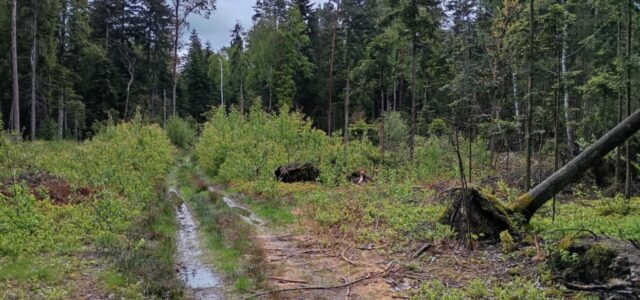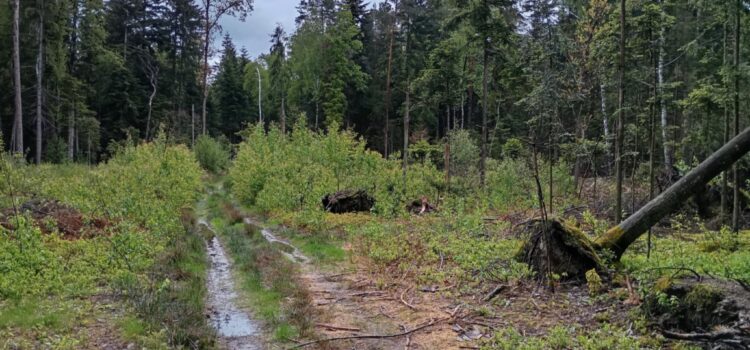

Ancestral Land Under the Axe. How the System Failed the Farmers of Sokola.
Feuilletons 6 June 2025 Patrycja

Sokola, a small village in Lublin Voivodeship near Ryki, is a place where time moves slowly, and the land is not just a source of livelihood but a symbol of heritage. For Elżbieta and Grzegorz Starowicz, an elderly farming couple, their private forest on a plot by a forest path was more than property—it was their ancestral land, a lifetime’s work, and a safeguard for their old age and their two daughters. In 2021, a storm broke their trees, but the real blow came later: someone illegally cut down their forest.
The perpetrator, a man acting without permission, claimed it was a “mistake,” and the system—police, prosecution, courts—sided with him. The Starowiczes lost not only their trees but also their health, dignity, and faith in justice. Now, they must pay 15,000 PLN in court costs to the person who robbed them. How is it possible that the law, which requires farmers to obtain permits to cut firewood, allows someone to destroy another’s property with impunity?
The Storm and the Start of the Tragedy
It all began with a storm in 2021 that ravaged Lublin Voivodeship. In Sokola, the wind not only broke trees on the Starowiczes’ plot but also destroyed their farm buildings: the barn roof was torn apart, and the yard was littered with debris. With no insurance, no savings, and an urgent need for repairs, the couple focused on saving their home, delaying the cleanup of their forest. The trees could wait, they thought, unaware that their nearly one-hectare forest of 80-year-old oaks and pines would become a target. The plot, located by a forest path, was clearly marked with visible boundaries but inaccessible after the storm—felled trees lay tangled, forming a labyrinth. Busy with repairs, the Starowiczes checked the forest sporadically, believing their ancestral land was safe. Meanwhile, a man advertising in the local paper as a specialist in clearing storm-damaged trees was operating in the area. He bought wood from neighbors but entered the Starowiczes’ plot without permission, without contacting the forester, and without knowing the plot’s number. His logging was illegal, unlike the strict procedures the owners themselves had to follow.
On January 6, 2022, Grzegorz went alone to check the forest. His daughter was visiting, so Elżbieta stayed home to greet her. Minutes later, Grzegorz returned shaken, nearly in tears. Elżbieta, fearing a heart attack, was horrified when he described what he saw. With their daughter, who had arrived from Małopolska, they decided to act. That same day, they reported the incident to the Ryki police. The local officer joined them at the site. The sight was devastating for the elderly couple. Valuable trees, their life’s legacy, lay cut as if ready for transport, with some already gone. The police recorded details and measured the stacked wood, ignoring the trees left on the plot.
The Battle with the System
The investigation, meant to deliver justice, became a series of disappointments. Despite evidence of illegal logging, the police suggested the Starowiczes might have previously agreed to the cutting. When the perpetrator was caught attempting to remove wood, he was noted but not detained, and the wood wasn’t secured. The local officer even suggested Grzegorz call the perpetrator to “work it out.” The Starowiczes refused—they wouldn’t negotiate with someone who harmed them. When the perpetrator finally contacted them, instead of apologizing, he offered to buy the wood at a low price—300-500 PLN per cubic meter, though Elżbieta learned from the forestry office it was worth up to 800 PLN. When they demanded a higher amount to cover losses, he replied he’d rather buy cheaper from state forests. Showing no remorse, he laughed in their faces, an insult Elżbieta recalls with humiliation. The case reached the prosecutor’s office, but hope for justice faded quickly.
The Ryki prosecutor’s office dropped the case, ruling the perpetrator’s “mistake” didn’t constitute a crime. The reasoning was shocking: he acted in daylight, not at night, suggesting openness. The Starowiczes, spending their savings on a lawyer and appeals, filed a complaint. The case returned to the Ryki court, but the judge upheld the prosecutor’s decision, accepting the “mistake” excuse. Elżbieta insists this was impossible—the plot was the first by the path, clearly marked. Another appeal, resolved in February 2025, failed: the appellate judge deemed the perpetrator innocent. Instead of justice, the Starowiczes received a bill—15,000 PLN in court costs. “How can someone destroy our property, laugh in our faces, and we’re the ones who pay?” Elżbieta asks, barely holding back tears. Grzegorz, whose health deteriorated from stress, can hardly speak about it.
A Law That Failed
Polish forest law is strict—in theory. Under the Forest Act, most logging in private forests requires notification to the forestry office and an asygnata specifying the plot number, owner details, and tree types. Trees must be stamped, and non-compliance risks fines or imprisonment. The Starowiczes always followed these rules, even for small firewood cuts. The perpetrator, acting without any formalities, faced no consequences. Why? The key issue is weak enforcement of laws on illegal logging on private land. Though the Forest Act imposes penalties for unauthorized logging, prosecution is often hindered by limited oversight of private forests and poor evidence collection. Prosecutors frequently drop such cases, citing lack of criminal intent, as when perpetrators claim a “mistake.” Consequently, landowners like the Starowiczes are left unprotected, while perpetrators evade punishment. The failure to secure evidence—like the police ignoring trees left on the plot—further complicates proving guilt. These gaps, combined with law enforcement’s sluggishness, allowed the perpetrator to walk free, leaving the victims with more bills.
Lost Heritage, Failing Health
The consequences are devastating for the elderly couple. The forest, meant to secure their retirement or support their daughters, is gone. Court costs of 15,000 PLN and 20,000 PLN spent on a lawyer have financially ruined them. Grzegorz, with heart issues and a recent lung surgery, struggles with his health, worsened by the stress of the legal battle. Elżbieta, though trying to stay strong, feels helpless and humiliated. For them, this land was their family’s history, their ancestors’ labor, and their dream of a secure future. Now, only memories and bitterness remain. The most painful part is the sense that the system, meant to protect them, favored a perpetrator who disregarded the law and human decency.
This story is not just the Starowiczes’ tragedy but a warning for other farmers and landowners. The law, which demands strict compliance from honest people like Elżbieta and Grzegorz—asygnatas, stamps, forester approvals—proves powerless against those acting illegally. The perpetrator had no permit, didn’t contact the forester, and didn’t know the plot number. His “mistake” was deemed a valid defense, while the Starowiczes, who followed every rule, lost everything. Why did the police drop the case despite clear violations? Why did the prosecutor rule that acting “in daylight” absolves responsibility? Why did the courts, from Ryki to the appellate level, overlook the farmers’ suffering? These unanswered questions highlight systemic flaws that allow illegal loggers to escape punishment. The Starowiczes aren’t alone—similar stories could affect anyone who owns land and trusts the law to protect them.
“We want to warn others: don’t be naive, guard your property, because the system won’t protect you,” the couple says. Their fight for justice cost them 35,000 PLN, their health, and their trust in the state. Yet they persevere, sharing their story to spark debate about legal reform. Must landowners like them live in fear of another “mistake”? Is the honesty they’ve lived by worthless today? The Starowiczes urge authorities to address legal gaps that let perpetrators evade accountability while victims pay for others’ wrongs. Their story is a cry of despair but also a call to action—for other farmers, the media, and anyone who believes justice should be the state’s foundation.
What’s Next for Elżbieta and Grzegorz?
The forest won’t regrow in their lifetime, Grzegorz’s health won’t recover, and court debts underscore the injustice. But their quiet voice carries far. By sharing their ordeal, they shine a light on a system that fails the vulnerable. Will anyone listen? Will the law change to protect people like them? These questions linger as Elżbieta closes the door of their modest Sokola home. Their ancestral land is gone, but their fragile hope for justice still flickers. For them and others who may share their fate, it’s time for change—before another “mistake” destroys another life.






